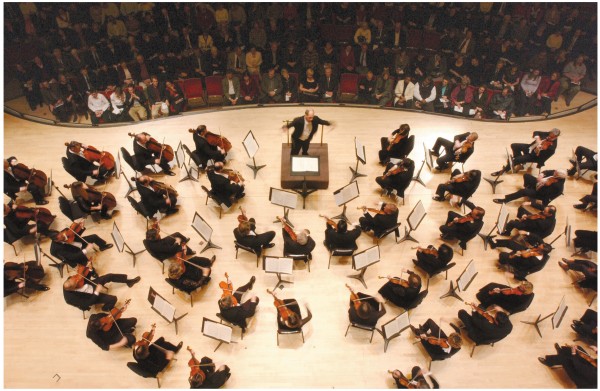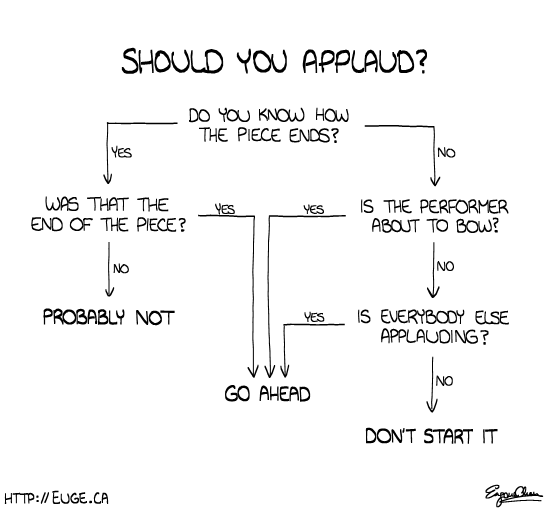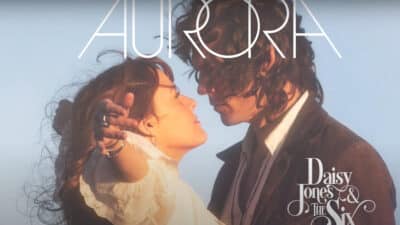Music
The rules of going to a classical concert (are not what you think)
One of the main fears I hear from people cautious about going to a classical concert for the first time concerns their perception of the rules of etiquette. What am I supposed to wear? When am I supposed to clap? What if I don’t know anything about the music? I’m not posh enough!
Well allow me to dispel some myths and clarify what exactly goes on at a concert of classical music – you might be surprised at how it really works.
What to wear
Pretty much whatever you like (within reason). Many people assume that it’s all top hat and tails, but the truth is people wear what they normally wear whenever they go out. Sure, some might get a little more dressed up than normal (and feel free to if you want to make it special), but nothing too fancy; anyone going all out would look rather out of place (unless you’re going to Glyndebourne). Many might be in suits simply because they’ve come straight from work.
A good rule of thumb is, if you’d feel comfortable going to a restaurant dressed as you are, then you’ll likely be fine at a concert.
The audience is full of regular people who just are passionate about music. No one is judging others on their clothes and no one knows how much (or little) you know about the music (you might be surprised at how little they know), they’re all there to enjoy the performance.
Outfits: Net-a-Porter.com / mrporter.com
Preparation
Get there with some time to spare, just like you would attending any other event. Most venues will have a bar so you can get a drink and snacks beforehand, though different places will have different rules regarding whether you can take refreshments into the hall with you.
Concerning the music itself, whether you do any research about the music and composers being performed is entirely up to you, though I personally feel that the more context one has the deeper the understanding and enjoyment of the music, especially when it comes to music one is unfamiliar with. Every concert will have at least a basic program available and some will include some details and notes about the pieces being performed. Operas will also usually have a synopsis of the plot and often surtitles above the stage so you can follow along during the show.
I’d say a quick read of the Wikipedia page for the composer and the pieces you’ll be seeing beforehand will give you a good basic idea of what it is you’ll be listening to, who it was that created it and what kind of significance it had in the musical world and in society at the time, all of which is knowledge that can deepen one’s appreciation of the music itself. Of course, if you want to go in cold and experience the whole thing completely fresh, that’s fine too – there are no rules!
When to clap
This is a common cause of concern and there’s a good general rule to follow: if in doubt, don’t. If other people are clapping, it’s probably fine.
In most situations, clapping is not appropriate between movements and is saved for the end of the piece. Movements in classical pieces are like the chapters of a book; each are a self-contained musical statement with a clear beginning and end (though not always, sometimes they flow into one another) and have their own mood, tempo and style, but they compliment each other, sometimes share material and all come together to make the piece as a whole one big musical statement. Try following this handy chart.
Noise
The most important thing to remember is to turn off your phone. I mean it. Really. TURN IT OFF. Not on silent, OFF. Believe me, the buzz of a vibrate alert will sound like a klaxon when it goes off during an intimate moment and you will want to bury yourself in a hole in the ground. There really is no excuse for this and it is probably the biggest sin one could possibly make during a classical performance: if your phone goes off every single person in that hall will hate you and the embarrassment will follow you to your grave. TURN OFF YOUR MOBILE PHONE.
Have fun and enjoy it
Aside from the don’ts, there’s also the dos: do have fun. Do be attentive and listen closely. Do invest yourself in the performance and the pieces. Music is not just a performer’s art, it is a listener’s one too – music only exists when it is played and when it is heard. It is a social and bonding experience between the performer and the audience, and the delight of a classical concert is that you get to share in such deep, beautiful, exciting and transformative art and emotions with so many other people at once.
So throw out your preconceptions, book some tickets and go hear some classical music. It’s a wonderful club and everyone’s invited.
Check out the upcoming classic events at Ticketmaster.co.uk.












